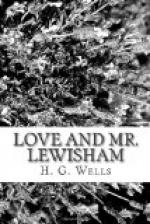But consolation of a sort came soon enough. As she took her seat she distinctly glanced up at the gallery, and afterwards as he knelt to pray he peeped between his fingers and saw her looking up again. She was certainly not laughing at him.
In those days much of Lewisham’s mind was still an unknown land to him. He believed among other things that he was always the same consistent intelligent human being, whereas under certain stimuli he became no longer reasonable and disciplined but a purely imaginative and emotional person. Music, for instance, carried him away, and particularly the effect of many voices in unison whirled him off from almost any state of mind to a fine massive emotionality. And the evening service at Whortley church—at the evening service surplices were worn—the chanting and singing, the vague brilliance of the numerous candle flames, the multitudinous unanimity of the congregation down there, kneeling, rising, thunderously responding, invariably inebriated him. Inspired him, if you will, and turned the prose of his life into poetry. And Chance, coming to the aid of Dame Nature, dropped just the apt suggestion into his now highly responsive ear.
The second hymn was a simple and popular one, dealing with the theme of Faith, Hope, and Charity, and having each verse ending with the word “Love.” Conceive it, long drawn out and disarticulate,—
“Faith will van ...
ish in ... to sight,
Hope be emp ... tied in deli
... ight,
Love in Heaven will shine
more bri ... ight,
There ... fore
give us Love.”
At the third repetition of the refrain, Lewisham looked down across the chancel and met her eyes for a brief instant....
He stopped singing abruptly. Then the consciousness of the serried ranks of faces below there came with almost overwhelming force upon him, and he dared not look at her again. He felt the blood rushing to his face.
Love! The greatest of these. The greatest of all things. Better than fame. Better than knowledge. So came the great discovery like a flood across his mind, pouring over it with the cadence of the hymn and sending a tide of pink in sympathy across his forehead. The rest of the service was phantasmagorial background to that great reality—a phantasmagorial background a little inclined to stare. He, Mr. Lewisham, was in Love.
“A ... men.” He was so preoccupied that he found the whole congregation subsiding into their seats, and himself still standing, rapt. He sat down spasmodically, with an impact that seemed to him to re-echo through the church.
As they came out of the porch into the thickening night, he seemed to see her everywhere. He fancied she had gone on in front, and he hurried up the boys in the hope of overtaking her. They pushed through the throng of dim people going homeward. Should he raise his hat to her again?... But it was Susie Hopbrow in a light-coloured dress—a raven in dove’s plumage. He felt a curious mixture of relief and disappointment. He would see her no more that night.




